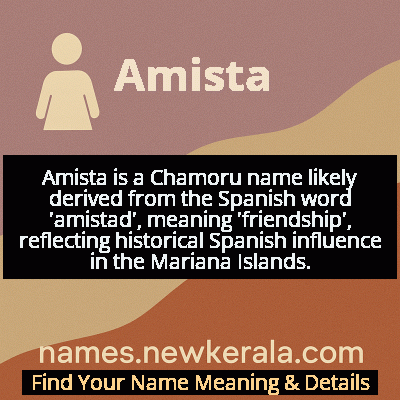Amista Name Meaning & Details
Origin, Popularity, Numerology Analysis & Name Meaning of Amista
Discover the origin, meaning, and cultural significance of the name AMISTA. Delve into its historical roots and explore the lasting impact it has had on communities and traditions.
Name
Amista
Gender
Female
Origin
Chamoru
Lucky Number
9
Meaning of the Name - Amista
Amista is a Chamoru name likely derived from the Spanish word 'amistad', meaning 'friendship', reflecting historical Spanish influence in the Mariana Islands.
Amista - Complete Numerology Analysis
Your Numerology Number
Based on Pythagorean Numerology System
Ruling Planet
Mars
Positive Nature
Generous, passionate, energetic, and humanitarian.
Negative Traits
Impulsive, impatient, moody, and can be overly emotional.
Lucky Colours
Red, maroon, scarlet.
Lucky Days
Tuesday.
Lucky Stones
Red coral, garnet.
Harmony Numbers
1, 2, 3, 6.
Best Suited Professions
Military, sports, philanthropy, leadership roles.
What People Like About You
Courage, energy, leadership, generosity.
Famous People Named Amista
Amista Baza
Cultural Preservationist
Founded the Chamoru Heritage Foundation to preserve indigenous traditions
Amista Chargualaf
Educator
Developed Chamoru language curriculum for Guam public schools
Amista San Nicolas
Community Leader
Organized intergenerational cultural exchange programs throughout Micronesia
Name Variations & International Equivalents
Click on blue names to explore their detailed meanings. Gray names with will be available soon.
Cultural & Historical Significance
During the Spanish colonial period, the name took on additional meaning as Chamoru people navigated cultural preservation while adapting to new influences, making fidelity to one's heritage particularly significant. The adaptation of Spanish-derived words like 'amista' from 'amistad' demonstrates the cultural synthesis that occurred while maintaining distinct Chamoru identity. Today, Amista represents both personal integrity and cultural continuity, serving as a reminder of the enduring Chamoru values that have survived centuries of colonial influence and modernization pressures.
Extended Personality Analysis
Individuals named Amista typically exhibit strong characteristics of reliability, emotional intelligence, and deep commitment to their relationships. They are often described as the 'anchors' in their social circles - people who remember important dates, keep confidences, and maintain connections even across distances and time. Their loyalty extends beyond personal relationships to include dedication to their principles, work, and community causes. Amistas tend to be excellent listeners who offer thoughtful advice rather than quick solutions, making them sought-after confidantes.
While they may appear reserved initially, they form deep, lasting bonds and will fiercely protect those they care about. Their consistent nature makes them pillars of stability in both family and professional settings. However, this strong sense of responsibility can sometimes lead to challenges with setting boundaries, as they may take on too many obligations. In professional environments, Amistas excel in roles requiring trustworthiness and long-term commitment, often becoming the institutional memory of organizations through their dedication and attention to detail.
Modern Usage & Popularity
In contemporary usage, Amista remains a meaningful choice among Chamoru families both in Guam and throughout the diaspora, particularly for those seeking to honor cultural heritage while embracing modern identity. While not among the most common names in official birth records, it has seen a resurgence in recent years as part of the broader cultural renaissance movement among Chamoru people. The name appears frequently in cultural events, educational programs, and community organizations that emphasize Chamoru language revitalization. Social media platforms have also contributed to its visibility, with hashtags like #Amista and #ChamoruNames gaining traction among younger generations connecting with their heritage. The name's appeal extends beyond the Chamoru community to parents of various backgrounds who appreciate its beautiful meaning and melodic sound, though it remains most significant within its cultural context where it serves as a living connection to Chamoru values and identity.
Symbolic & Spiritual Meanings
Symbolically, Amista represents the unbreakable bonds that connect individuals to their families, communities, and cultural heritage. Like the traditional latte stones that support Chamoru structures, the name symbolizes strength through connection and the enduring nature of carefully maintained relationships. It evokes images of the deep roots of the ifit tree, which withstand typhoons through its interconnected root system, and the reliable currents of the Pacific that guided ancient navigators. The name also carries metaphorical weight as a bridge between generations - honoring ancestral traditions while embracing contemporary life. In a broader sense, Amista symbolizes the human capacity for steadfastness in a changing world, representing the quiet strength that comes from knowing one's place in a larger tapestry of relationships and responsibilities that transcend individual existence and connect us to both past and future.

